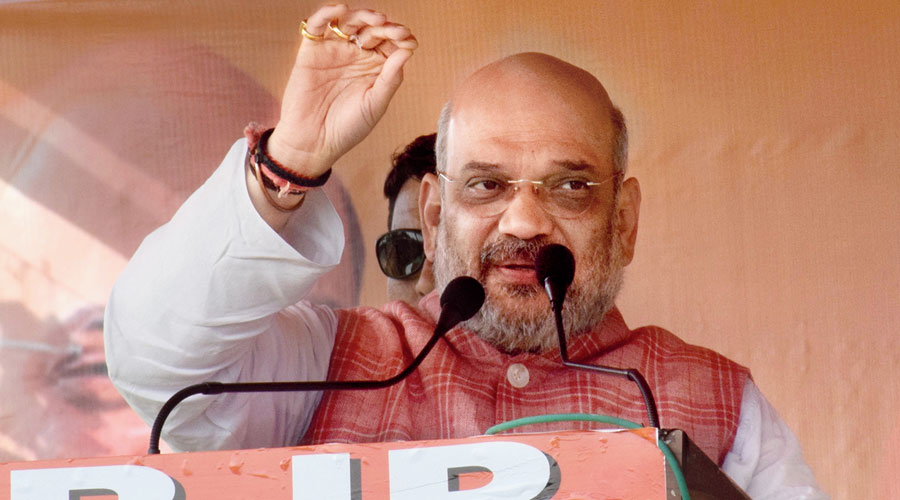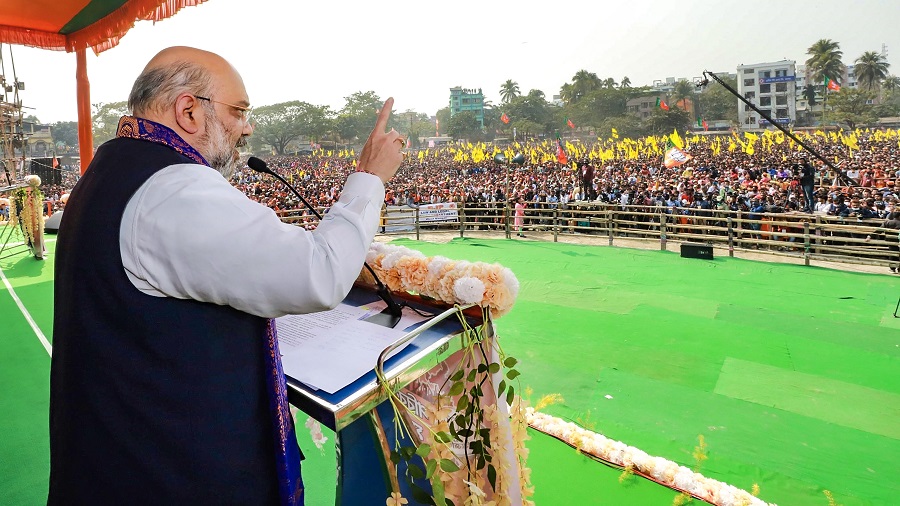Union home minister Amit Shah on Thursday steered clear of laying down a clear timeframe for the implementation of the Citizenship Amendment Act (CAA), disappointing many in the Matua community that has a significant presence in over 30 Assembly seats in Bengal.
Shah said the citizenship issue of the immigrant Matua community would be resolved “the moment” the vaccination process for Covid-19 was over and the pandemic situation was under control.
Addressing a public rally at the Matua headquarters in Thakurnagar, Shah said: “We have passed the CAA.… The moment the vaccination process is over and the corona situation is under control, all of you will get citizenship.”
Probably aware that such an announcement would not cut much ice, he promised a slew of initiatives for the Matua community if the BJP came to power in Bengal.
Seeking to make his promise about the CAA more credible before the audience, Shah said no one, not even Mamata Banerjee who has opposed the act tooth and nail, can stop its implementation.
“I was supposed to come here earlier but could not because of some unavoidable reasons, which made Mamata Didi happy as she thought I wouldn’t come any more. But let me assure you that I will keep coming back till she is defeated,” Shah had said at the beginning of his speech, drawing loud cheers.
But his comment linking the implementation of the CAA with the completion of the vaccination — a repeat of the answer he had given this correspondent during his December 20 Bolpur trip — came as a shock for many in the Matua community.
State BJP leaders had raised expectations that the Union home minister would at the Thakurnagar rally roll out a definite schedule for the act’s implementation. It remains unclear when the vaccination campaign in a country of 130-crore-plus people would conclude.
As the BJP had reaped political dividends from Matua-dominated areas of the state in the 2019 Lok Sabha elections by dangling the citizenship carrot, the community has been eagerly awaiting the implementation of the CAA.
Against this backdrop, chief minister Mamata Banerjee recently spun a counter-narrative.
She said the BJP was confusing the Matuas by promising citizenship even though these immigrants from Bangladesh, most of whom possess documents like the voter card, Aadhaar card, ration card and land deeds in their names, were already Indian citizens.
The two contrasting narratives on citizenship will be at the core of the Trinamul-BJP tussle in the 30-odd Matua-dominated Assembly segments — spread over North 24-Parganas, Nadia and north Bengal — in the upcoming elections.
If the immediate reactions of some in the audience after the rally were any indication, the BIP should have reason to worry.
“It’s very clear that we will not vote for the BJP if they cannot resolve the citizenship issue,” Harashit Gonsai, a prominent community leader, told The Telegraph after Shah’s meeting.
Disappointment was visible on the face of Gonsai, who was surrounded by his associates. He said he would convey his feelings to Santanu Thakur, the BJP MP from Bongaon and the tallest Matua leader.
Other Matua community members like Saikat Giri, a BJP supporter who had come from Nadia, were equally upset. “Citizenship is our key demand, but there was no clear answer when we will get it,” Giri said.
The 27-year-old school teacher, who has an Aadhaar card and a ration card, could not explain why he felt his Indian citizenship was in doubt.
This lack of clarity is not unique to Giri: scores of Matuas think they need a citizenship card or an equivalent document to have the same status as other Indians.
That the Matuas were expecting a specific announcement was clear from the speeches that community leaders delivered before Shah’s arrival at the venue.
Most of the speakers said their demand was unconditional citizenship through the CAA. Some of the speakers fuelled hopes that Shah would deliver on the demand soon, leading many in the audience to expect the issue to be resolved before the Assembly polls.
The manner in which Shah began his speech bore hints that an announcement was imminent. He said: “I had promised that I would come to Thakurnagar and clear the confusion about the CAA.”
He then switched to topics such as the contribution of Matua icons like Hari Chand and Guru Chand Thakur towards the social uplift of the community, and the misrule of the Mamata government, before returning to the main theme.
“Once the CAA is implemented, the refugees will get the respect that has been their due for a long time. We will also be able to slam the doors on illegal infiltrators,” Shah said.
His failure to offer a timetable dashed hopes, but the Union home minister couldn’t have done anything else as his ministry had recently informed Parliament that the deadline to prepare the CAA rules had been extended to July 9, 2021.
Although many in the community were upset, Santanu, chief of the All India Matua Mahasangha and the local MP, expressed satisfaction with Shah’s promise.
“We are satisfied with what he said today.… He came such a long way to offer the citizenship assurance. It is a great gesture. We don’t see any uncertainty on the issue any more,” he said.
Asked if his organisation had demanded any specific timeframe for the implementation of the CAA, he said: “We cannot demand a deadline for obvious reasons. Our people have realised that implementation is not possible overnight.”
While Santanu was prepared to allow the Centre time to tackle the pandemic, he was unequivocal in his demand for a simplified process of citizenship, effectively a reassertion of the demand for unconditional citizenship.
This demand, many in the BJP believe, is the real challenge as the act requires a citizenship seeker to apply for the status, which in turn implies that he or she has been living illegally in India.
Most Matuas this correspondent spoke to said they did not want to convey the impression that they had been living illegally in India.
“The pandemic may have given the home minister a chance to explain the delay in the implementation of the CAA, but the question is: what will happen when the rules are finally announced in line with the provision of the act that Parliament passed?” a Matua leader asked.











